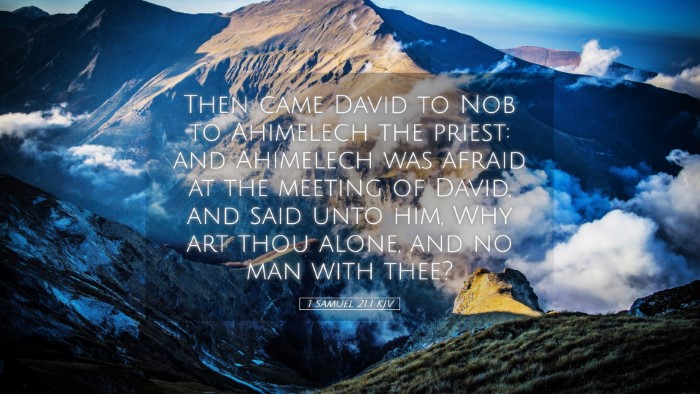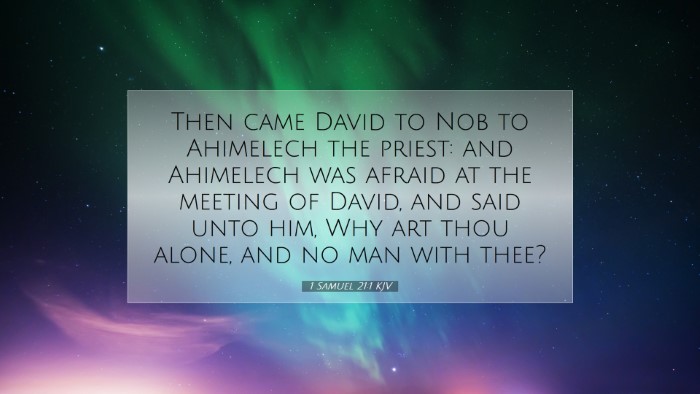Commentary on 1 Samuel 21:1
Verse Summary: 1 Samuel 21:1 depicts David's flight from Saul, highlighting his encounter with Ahimelech, the priest at Nob. This verse marks a critical moment in David's life, illustrating themes of desperation, divine providence, and the complexity of God's plans in the midst of human turmoil.
Contextual Background
This passage occurs during a perilous time in David's life when he is fleeing from King Saul, who seeks to kill him. To fully appreciate the significance of this encounter, it is vital to understand the preceding events leading up to this flight. David had just been anointed by Samuel (1 Samuel 16) and had gained fame after defeating Goliath (1 Samuel 17). However, Saul's jealousy had turned intense, forcing David to seek refuge.
Theological Insights
- God's Providence: David's journey to Nob reflects God's unfailing guidance in times of distress. Despite his desperation, God orchestrates events that ultimately serve David's purposes and fulfill His covenant promise.
- Seeking Solace: David, in his flight, seeks aid from the priest, Ahimelech. This act of seeking refuge reveals an essential truth about human nature—the instinct to seek divine assistance in our times of need.
- Further Implications: This moment foreshadows the development of David's relationship with God and his future role as king, as he learns to rely on God for protection and provision.
Commentary Excerpts
Matthew Henry's Commentary
Matthew Henry reflects on the desperation of David, emphasizing how he came to Ahimelech without any companions and in great need. Henry notes that David's visit to Nob was a significant move as he was both seeking bread and weapons due to his urgent situation. This act demonstrates a blend of human effort and divine providence, marking a consequential point in Israel's history.
Albert Barnes' Notes
Albert Barnes provides a deeper examination of the priestly duties in a time of national crisis. He highlights Ahimelech’s initial fear and how it suggests the perilous situation under Saul's authority. Barnes underscores the righteousness of David as he asks for consecrated bread, which underscores themes of hunger and holiness. This nuanced conversation with Ahimelech sheds light on the larger struggle between the faithful and tyrannical governance.
Adam Clarke's Commentary
Adam Clarke adds richness by pointing to the sociopolitical implications of David's actions. He indicates that David's stealthy approach to Nob signifies not only a moment of weakness but also an emerging leader's characteristic of seeking counsel during adversity. Clarke encourages readers to recognize that God often uses moments of vulnerability to build strength and prepare His servants for future leadership roles.
Practical Applications
This passage fosters numerous applications for pastors, students, theologians, and Bible scholars:
- Prayer and Dependence: Like David, believers should cultivate a posture of dependence on God, particularly in trials. Seeking God through prayer during crises is crucial for spiritual survival.
- Leadership Under Duress: This narrative offers a paradigm for leaders, emphasizing the need for wisdom when navigating through adversities while depending on God's promises.
- Divine Assistance: The encounter with Ahimelech illustrates that God often provides for His people in unconventional ways. Just as David found help from a priest, believers can look beyond the immediate situations for God’s provision.
Conclusion
1 Samuel 21:1 serves as an essential reflection on David’s early experiences of fleeing from Saul and highlights pivotal themes of reliance on God, the complexities of leadership, and the necessity of seeking divine assistance in times of need. Through the insights provided by the comments of Matthew Henry, Albert Barnes, and Adam Clarke, readers are invited to engage with the text and consider its implications for their faith journeys.


